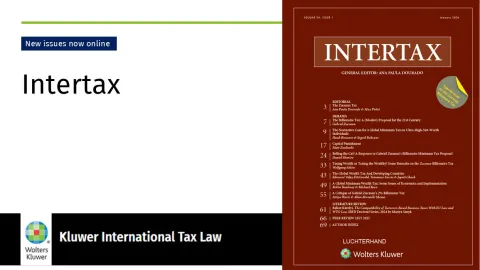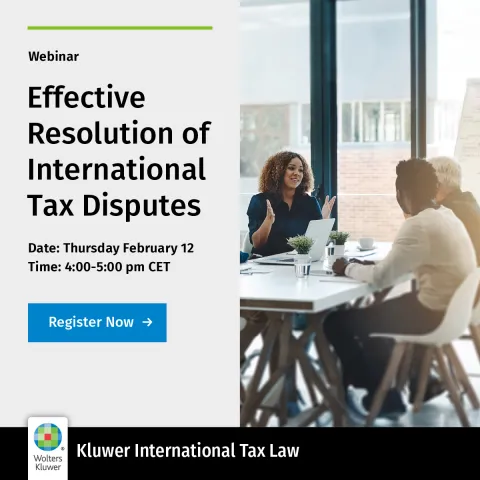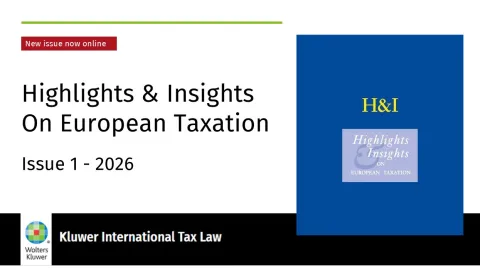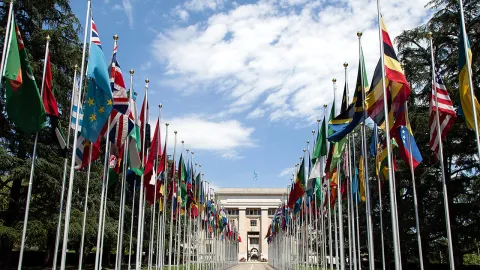Comments with Proposed Text for the UN Intergovernmental Committee Drafting the International Tax Cooperation Convention
August 6, 2025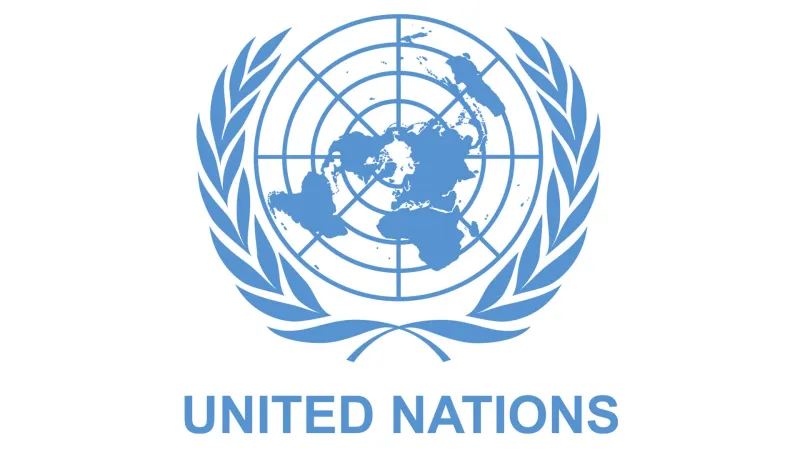
From Pramod Kumar Siva and William Byrnes of Texas A&M University Law's International Tax Risk Management Graduate Program
Re: Workstream I (Framework Convention), Workstream II (Protocol on Cross-Border Services and Royalties), and Workstream III (Protocol on Dispute Avoidance/Resolution)
Dear Chair and Distinguished Members of the UN Intergovernmental Negotiating Committee:
We appreciate the opportunity to provide input on the development of the UN Framework Convention on International Tax Cooperation. We applaud the Intergovernmental Negotiating Committee’s inclusion of academic institutions as stakeholders to attend the sessions and engage with the diplomatic delegates.
We are academic researchers in international tax policy, and write to offer independent business-aligned perspectives on all three workstreams under negotiation. We submit a robust discussion of our comments with proposed text to contribute to the ongoing discussions of the International Tax Cooperation Convention. Our comments and recommendations are submitted in our personal capacity and do not represent an official statement or position of Texas A&M University or our respective employers.
Our submission advocates for a consensus-based, growth-friendly international tax framework. Our submission provides both high-level policy guidance and specific textual suggestions for treaty provisions. We strongly urge the Committee to align the Convention with established international tax norms to avoid fragmentation, double taxation, and investment deterrence.
We believe our positions represent a broad consensus of the international business community, which seeks a stable, fair, and neutral international tax system that facilitates trade and investment while providing governments with the tools to prevent abuse. The UN Convention is a historic opportunity to achieve that inclusively. But inclusion must not come at the cost of certainty – a balance must be struck, and we are confident it can be.
Thank you for considering our comments and recommendations. We are hopeful that the Intergovernmental Negotiating Committee will integrate our business-aligned perspective as it drafts the Convention and protocols. We strongly support the UN’s efforts to promote inclusive and effective tax cooperation, and we remain at your disposal for any further input or clarification that may assist the Committee.
Workstream I – Framework Convention: The core Convention should enshrine clear, principle-based rules and a commitment to eliminate double taxation, thereby providing certainty for cross-border business. Key principles of simplicity, stability, transparency, and neutrality in taxation should guide the framework. The Convention’s governance must be consensus-based, rather than a simple majority, to ensure broad buy-in and stability.
Business community involvement in ongoing dialogue is crucial for achieving practical and workable outcomes. The framework should explicitly commit to tax neutrality (avoiding discrimination among industries or between cross-border and domestic commerce) and relief of double taxation as fundamental objectives. It should also clarify how new international tax rules will interact with domestic tax laws to prevent conflicts. Capacity-building components should focus on helping developing countries administer tax rules without undermining taxpayer certainty or deviating from globally agreed-upon standards.
Workstream II – Protocol on Cross-Border Services and Royalties: The services and royalties protocol should strike a balance between source-country taxing rights and the need to avoid double taxation and excessive complexity. We urge an optional gross-or-net taxation mechanism for services, allowing income from services to be taxed via a modest gross withholding tax or, at the taxpayer’s election, on a net profits basis. This flexibility would mitigate the drawbacks of purely gross-basis taxation – which even the UN Tax Committee acknowledges “may not be ideal” in practice – by permitting taxation on actual profit where appropriate.
The protocol’s scope must be clearly defined: “fees for technical or business services” should be precisely delineated to avoid overlapping interpretations by different countries, which could otherwise yield significant complexity and disputes rather than simplification. Similarly, the definition of “royalties” should be clear and narrowly tailored to genuine intellectual property licensing; it should exclude normal payments for software or digital services that do not involve transfer of a copyright, to prevent overbroad source taxation. Without careful scoping, a broad expansion of source taxing rights over services could stifle the growth of services exports (including from developing countries) and lead to unintended economic consequences.
To avoid over-taxation and multi-layered taxation, the protocol should include safeguards such as a reasonable withholding rate cap and a requirement that the residence country grants double tax relief (in the form of a credit or exemption) for any source-taxed income. These measures, along with the gross/net option, will promote tax neutrality and investment by ensuring that cross-border service providers are not unfairly penalized compared to local businesses.
Recommendations of Proposed Text for Workstream II
Workstream II addresses one of the thorniest areas – how to allocate taxing rights on cross-border services and royalties. Businesses recognize the challenges that digitalization and globalization pose to the traditional permanent establishment paradigm, and we support equitable solutions. However, we caution that overly expansive source taxation of services, especially on a gross basis, could backfire – leading to double taxation, reduced trade in services, and even harm to the economies of developing countries that the rules intend to help. We recommend a balanced approach built on clear scope definitions, optionality between gross and net taxation, and preservation of double tax relief.
Scope and Definitions – Services: The protocol should precisely define what payments are within its scope. We note that in the Draft Issues Note for this workstream, there was an inclination to “keep the services protocol broad in scope,” i.e., to cover all cross-border services, not only highly digital services. From a business perspective, a blanket approach covering “any service, irrespective of where performed or the nature of the service” (as seen in the proposed UN Model Article XX) raises serious concerns. Such breadth would bring all service fees into potential source taxation, greatly expanding withholding tax obligations and complexity.
Different countries would likely interpret what counts as “fees for services” differently, causing immediate uncertainty and likely tax disputes. Moreover, many developing countries today are competitive exporters of services (e.g. in IT, outsourcing, creative industries); their growth could be stifled if partner countries impose new withholding taxes on those service exports. In light of these risks, we urge that the protocol’s scope be carefully circumscribed.
One option is to limit the application of source-country taxing rights to services of a particular character (for example, automated digital services or technical consultancy, as was initially considered), or to impose a materiality threshold (such as a de minimis amount or duration below which no tax applies, akin to a services permanent establishment threshold of X days). If the intent is genuinely to cover all services, then robust definitions and exclusions are needed. For instance, clarify that services ancillary to goods (e.g., training provided with the sale of equipment) or services already taxed under other articles (like international transport or natural resource extraction) are excluded to avoid double coverage. Clear definitions will prevent the protocol from inadvertently capturing transactions it should not and will facilitate uniform application by tax authorities.
Scope and Definitions – Royalties: Similarly, the royalties article in the protocol should align with international norms and be limited to genuine intellectual property uses. We specifically recommend that the definition of “royalties” exclude payments for standard software or cloud services that do not involve the transfer of IP rights.
The latest (2025) UN Model’s expansion of “royalties” to include software payments, “including payments that do not relate to the use of copyright in the software,” has alarmed businesses. Treating every software or digital product payment as a royalty subject to withholding would be a stark departure from the OECD approach. It could lead to double taxation (since the payer’s country withholds tax, but the payee’s country views it as business profits).
To avoid this, the protocol should either stick to the traditional definition (covering payments for the use of, or right to use, copyrights, patents, trademarks, etc.), or at least clarify that payments for personal or business use of software (without reproduction/distribution rights) are not royalties. Additionally, consider carving out payments for services that might have royalty-like elements (e.g., fees for software customization, which are services, not royalties). A clear separation between the services article and the royalties article will prevent overlaps where a payment might be ambiguously classified as both. Ambiguity in this area is a sure recipe for cross-border disputes.
Optional Gross vs. Net Taxation for Services: A pivotal recommendation from the business community is to allow flexibility in the taxation of services by permitting taxpayers to elect net-basis taxation in lieu of withholding. The UN Model’s new Article 12AA approach advocates gross-basis withholding on service fees as a straightforward solution widely adopted by many source countries. Yet, as the Draft Note itself acknowledges, “the gross taxation approach may not be ideal”– mainly because it taxes revenue without regard to profits and can over-tax high-cost, low-margin services.
To reconcile source countries’ desire for a straightforward collection mechanism with the need for fairness, the protocol could incorporate an elective regime: for example, a non-resident service provider could either accept a modest withholding (say, not exceeding a certain rate) on its gross fees or opt to be taxed on net profits (by filing a return in the source country, perhaps limited to income attributable to services performed in that country). Some countries already operate such schemes domestically or in treaties, often termed “refundable withholding tax” or net election. Including this option would be a game-changer for tax neutrality. It ensures that when the withholding tax on gross receipts would overshoot the actual profit (and thus represent double taxation, since the residence country typically taxes the net income), the business can seek taxation on net income instead. This preserves source taxing rights for countries that prefer the simplicity of withholding, while protecting against extreme outcomes for taxpayers. The elected net taxation could be conditioned on specific requirements (e.g., the taxpayer provides necessary books and proof of expenses, or perhaps only available to related-party service fees to prevent abuse), details that can be ironed out in commentary. The key point is that flexibility will reduce instances of unfair tax burdens while still allowing source countries to tax income earned within their borders.
Notably, an elective approach also addresses administrative capacity concerns: countries with limited capacity may lean on the simplicity of withholding, while more advanced administrations – possibly through bilateral mutual agreement – can accommodate net taxation where appropriate. Over time, as capacity grows, more states can migrate to net taxation without renegotiating the treaty framework.
Double Tax Relief and Coordination: The protocol should stipulate that any source taxation of services or royalties must be accompanied by double tax relief in the country of residence. This could be achieved by a clause in the Convention’s main text requiring Parties to eliminate double taxation by credit or exemption. In the context of services withholding, double taxation is a serious concern – if one country withholds 10 percent on gross and the other taxes the net income at 25 percent, there can be excess taxation if credits do not fully align. The Convention cannot directly change domestic credit rules, but by making double tax relief a treaty obligation, it empowers taxpayers to claim treaty-based relief.
Additionally, to prevent “multi-layer” taxation, the protocol could specify that intermediary payments for services are not each subject to withholding. For example, if a subcontractor in State A provides services to a firm in State B, which in turn provides services to a client in State C, we want to avoid cascading three levels of withholding on the same ultimate service. Clear sourcing rules and tie-breaker provisions (perhaps through a look-through for intermediate entities when they add no significant value) could help alleviate this issue. The ICC has explicitly warned of “double and multilayer taxation, if withholding tax is applied to each service payment made” down a chain. The protocol drafters should heed this by designing rules to tax the service income once at source, not repeatedly at each step.
Rate Limits: While the specific withholding rate may be left for negotiation, it is worth considering a ceiling rate in the Convention or protocol to prevent excessively high taxes on services/royalties. The OECD’s proposed Subject to Tax Rule (STTR) uses 9 percent as a nominal cap for certain payments; the UN might choose a different number. But including a reference (even in commentary) that rates should be “moderate and consider typical profit margins” would reflect a business-aligned view that the tax on gross should approximate the tax on net income. Excessive gross rates virtually guarantee double taxation (since few countries give credit for more tax than what would be due on the net profit).
Economic Impact and Periodic Review: As a final note on Workstream II, we strongly support the suggestion (raised by business groups) that the UN conducts or commissions an economic impact assessment of the new service and royalty provisions. This study should evaluate how the rules affect investment, trade in services, and tax revenues for different country groups. It can guide potential adjustments (the Convention could mandate a review conference after, say, five years to consider refinements in light of real-world experience). Such data-driven evaluation will ensure the protocol meets its objectives without unintended harm.
Suggested Treaty Text (Workstream II)
To illustrate the above concepts, we propose the following elements be included:
- Definition clause: “The term ‘fees for cross-border services’ means payments for services of any kind, wherever performed, but does not include payments to an enterprise of the other Contracting State if such payments are attributable to a permanent establishment of that enterprise in the first State or are covered under Articles [Royalties], [Shipping], [Employment Income], or other provisions of a tax treaty between the Contracting States.” (This excludes amounts taxed on another basis or through a local PE.)
- Taxing right clause: “Fees for cross-border services arising in a Contracting State and paid to a resident of another Contracting State may be taxed in the first Contracting State on a gross basis at a rate not exceeding [X]%. However, the beneficial owner of the fees, being a resident of the other Contracting State, may elect by notice to the competent authority of the first State to be taxed on a net income basis with respect to such fees, in which case the provisions of Article [Business Profits] (and, if applicable, Article [Permanent Establishment]) shall apply to the profits from such services as if the enterprise had a permanent establishment in the first State.” (This establishes the optional gross/net mechanism – a core recommendation herein.)
- Relief clause: “The State of residence of the service provider shall allow a credit against its tax on the income of the service provider for the tax paid in the source State on fees for cross-border services, in accordance with Article [Relief of Double Taxation] of this Convention, to ensure income is not taxed twice.” (This reinforces double tax relief.)
- Royalties definition clause: “The term ‘royalties’ means payments of any kind received as consideration for the use of, or the right to use, any copyright of literary, artistic or scientific work (including software to the extent of rights to exploit a copyright), patent, trademark, design or model, plan, secret formula or process, or for information concerning industrial, commercial or scientific experience. The term does not include payments for the mere use of, or access to, software or digital content where no rights to reproduce or distribute the software/content are granted to the user.” (This aligns with the OECD approach and excludes standard software-as-a-service payments from being treated as royalties.)
These textual suggestions aim to strike a workable compromise: source countries gain a broad but controlled right to tax services and royalties, while taxpayers gain clarity, an option for fair taxation on net income, and assurance against double taxation. In effect, it would transform the current patchwork (where some treaties have technical services clauses and some don’t) into a coherent multilateral rule, without undermining global investment.
In summary, Workstream II’s protocol should embrace flexibility and clarity. By doing so, it can achieve its goal of updating international tax rules for the modern economy, without sacrificing the principles of neutrality or imposing undue burdens that hinder cross-border trade in services. The business community is prepared to support rules that are clear, fair, and administrable – and the above recommendations are offered in that spirit.
Workstream III – Protocol on Dispute Avoidance and Resolution: We advocate strongly for predictable and binding dispute resolution mechanisms to give businesses confidence that tax disputes will not result in unresolved double taxation. The Convention should mandate a robust Mutual Agreement Procedure (MAP) between competent authorities, with clear timelines, and provide for mandatory binding arbitration if disputes remain unresolved after a specified period. A binding arbitration clause – analogous to those in many bilateral tax treaties and the BEPS Multilateral Instrument – would guarantee that even politically sensitive cases are resolved, thereby ensuring certainty for taxpayers. We acknowledge that some countries have concerns about arbitration; however, the status quo of protracted, unresolved disputes is untenable.
Importantly, the Workstream III discussions have noted concerns about the fairness and inclusiveness of arbitration as practiced in some investment treaties. The UN Convention can address this by designing an arbitration process that is balanced and accessible (e.g., arbitrators drawn from both developed and developing countries, and options for regional arbitration centers) while still being binding. Additionally, the dispute prevention aspect of this workstream should encourage advance rulings, joint audits, and information exchange, helping resolve issues before they escalate into disputes. Overall, a multilateral tax dispute resolution protocol will greatly enhance tax certainty and fairness for global investors.
Urgency of Consensus & Alignment with OECD/G20 – A common thread across these workstreams is the need for consensus-based rule-making that complements (and does not contradict) the OECD/G20 initiatives. A UN tax convention that diverges sharply from the international consensus (e.g., OECD’s Pillar One and Pillar Two framework) would pose significant risks. Competing or contradictory global standards would create uncertainty and double taxation for businesses. Moreover, a non-consensus Convention could prompt political backlash: for example, the G7 recently reached a “side deal” to accommodate the United States in Pillar Two implementation, leading to the removal of a proposed punitive U.S. tax (IRC §899) that would have targeted countries imposing “unfair” extraterritorial taxes.
If the UN process were to produce rules seen as deviating from agreed standards or penalizing certain groups, there is a countervailing threat of U.S. or G7 disengagement or retaliation. Members of the U.S. Congress have already warned that they stand ready to take action should international partners “walk away” from the G7 understanding on Pillar Two. Such action could include the revival of proposed IRC §899 “foreign investor” tax measures or even the invocation of existing authorities, such as IRC §891, to double tax rates on entities from uncooperative jurisdictions. These outcomes would fragment the international tax system and undermine the very goals of cooperation that this Convention seeks to advance.
To avoid this, the Convention must strive to reinforce the progress made in the OECD Inclusive Framework – for instance, by endorsing globally agreed minimum tax and nexus rules – rather than inventing conflicting regimes. In short, the UN tax convention should serve as a consensus-based complement to the OECD/G20 efforts, rather than a forum for divergence. A failure to achieve consensus would risk unraveling the fragile global accord on issues such as digital taxation and minimum taxes, to the detriment of all countries’ tax bases and economic development.
You may also like

